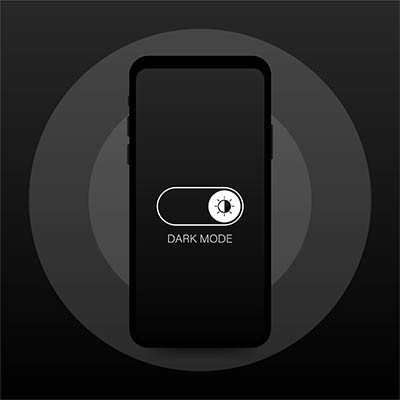PCSOFT Blog
Explaining Dark Mode
Dark mode is becoming commonplace in most modern technology solutions, incorporated into both desktop and mobile applications and even some operating systems. Despite being embraced by vendors and users, what does dark mode actually offer in terms of benefits? Let’s find out.
Dark Mode Is Not a New Concept
Dark mode has been around for quite some time--longer than you probably think, at any rate. In the early days of computing, screens were simple monochromatic monitors using only black and white. Early CRTs, or cathode-ray tubes, were coated with phosphor, giving the on-screen text a green, amber, or white hue. This would be displayed on a black background. This all changed in the 1980s when monitors began to focus on replicating the look of ink typed onto white paper.
All this time later, dark mode has now become a staple in most technology, which is ironic considering the fact that it was utilized in the past due to technical challenges rather than it being used as a choice.
The Benefits(?)
Dark mode inverts the background from white to black and the text from black to white. The main benefit to this is that it saves energy consumption on OLED and AMOLED technology, primarily on smartphones. Dark mode essentially turns off the pixels that are not in use and reduces the energy needed to keep them all on when the background is white.
Additionally, dark mode allows devices to remain operational even when the batteries grow low. Google notes that using its dark theme can be a major boon for increasing battery life. Here are some of the benefits:
- Visibility improvement for users with low vision or light sensitivity
- Easier to use in low-light environments
- The potential to reduce eye strain
Some Potential Negative Issues With Dark Mode
The biggest challenges facing users of dark mode have to do with people who have astigmatism, an ailment that might make reading white text on a black background difficult. There is research to suggest that dark mode can lower reading comprehension, as well, due to our innate preference for dark images on light backgrounds. Here are some other concerns to think about:
- Tiny and long blocks of text may be more difficult to read
- Color blindness can affect the ability of users to read the text in dark mode
- It may be harder to see in different lighting environments
All that said, most people can still use dark mode perfectly fine with few, if any, concerns.
Dark Mode is Now a Staple
Smartphones were the initial driving factor for dark mode, but many software vendors have jumped on the bandwagon, adding dark mode functionality in response to user expectations. If users keep asking how to switch to dark mode, it makes sense for developers to consider adding it as an option. Dark mode is widely supported by most operating systems, browsers, social media apps, productivity apps, and more.
Should You Use Dark Mode?
Strictly speaking, it depends on your preference. While there are clear benefits to using dark mode, it might not be ideal for some users. For most people, however, it is going to boil down to form over function. Sometimes changing things up with dark mode is fun, but in the end, it’s going to depend on personal preference.
Where do you stand on the light mode/dark mode debate? Do you prefer to use dark mode, and if so, why? Be sure to sound off in the comments.



Comments